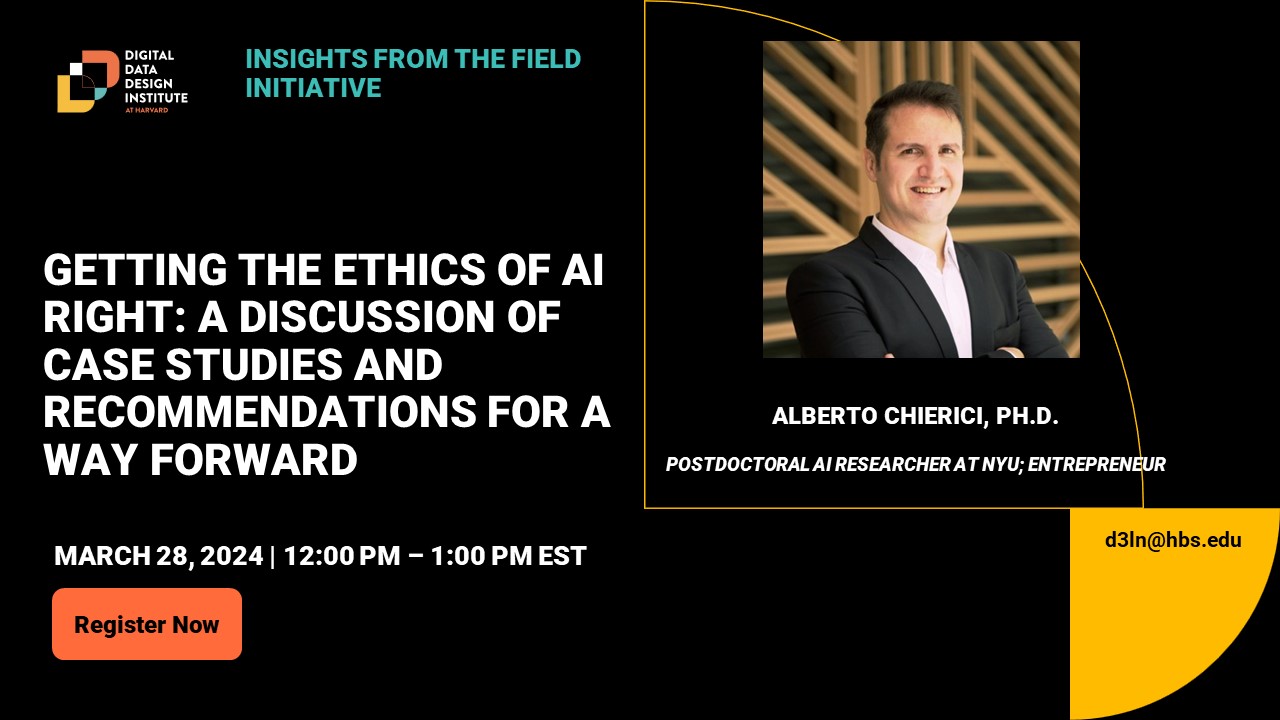The following insight is derived from a recent ‘Insights from the Field’ event featuring Alberto Chierici, PhD, on Getting the Ethics of AI Right: A Discussion of Case Studies and Recommendations for a Way Forward at the Digital Data Design Institute at Harvard.
Meet Our Guest Contributor:
Alberto Chierici | Postdoctoral AI Researcher at New York University

Alberto is an entrepreneur, scientist, and investor, who is passionate about supporting and empowering tech startups while contributing to academia and scientific research. With over ten years of experience in data science, natural language processing, conversational AI, and product management, Alberto brings a unique combination of skills to help shape the vision and direction of many tech-driven products. Alberto holds a Ph.D. in Computer Science from New York University where he continues to deeply explore human-computer interaction as a postdoctoral researcher.
For more information, visit Alberto’s LinkedIn profile and consider connecting with him.
Overview: Why does this matter?
Although artificial intelligence technology has been around for some time, current advancements in this space warrant more ethical approaches for developing and deploying AI systems to benefit a large portion of society. Artificial intelligence, generative AI in particular,has already shown immense potential to augment human capabilities. This potential, however, doesn’t seem to be evenly distributed. What’s worse, risks such as social and economic disparities are exacerbated by the uneven distribution of artificial intelligence, and are concentrated in specific regions based on demographic characteristics. It’s imperative to strive toward building a framework of transparency, fairness, and accountability around artificial intelligence on a global scale in order to mitigate this problem.
What is the key question, and what specific problem does this question attempt to address?
Drawing from his extensive work as an AI researcher, author, and tech entrepreneur, Alberto discusses the complexity and breadth of ethical considerations when it comes to developing, deploying, and using AI systems. Drawing from real-world case studies, Alberto highlights businesses that have been developing, deploying and using AI and robotic automation virtuously, contrasted with other businesses that have created more harm than good.. As such, one of the most important questions related to AI and ethics is how to define the impact of AI on human behavior and societal norms, and how to make even more apparent the processes for developing and deploying AI systems including research and development efforts. These questions generally point toward an overarching problem, which is the lack of a comprehensive and concerted ethical framework that addresses the complex challenges presented by AI, so that AI systems can work to enhance rather than diminish human values and capabilities.
What could be done to augment positive impacts and mitigate negative consequences?
Alberto proposes a multifaceted approach to addressing the ethical challenges of AI with a focus on educating the public, establishing transparent processes, and adhering to ethical principles that prioritize human-centered considerations when developing and deploying AI systems. Speaking of human-centered considerations, Alberto advocates for organizations to upskill their workforce, especially in legal and compliance departments, to equip them with the knowledge and skill sets they need to understand the complex workings of AI systems and evaluate ethical issues that accompany these systems. To this end, it’s necessary to engage in foundational questions about AI’s impact on humanity, a responsibility primarily shared by organizations and individuals leading tech innovations, in order for them to assess the broader, societal implications of their work.
For example, drawing from the work of Floridi, the principles in the field of bioethics such as beneficence, non-maleficence, autonomy, justice, and adding explicability specifically for AI systems can be adopted to aid the application of AI in non-medical contexts. A specific case in AI where similarly transparent principles could be useful is in “digital enveloped” environments such as social media, where the anonymity of the workings of AI systems can lead to unexplainable and potentially uncontrolled influence of AI on human behavior. The solutions to such complex challenges of developing and deploying AI are rooted in a collective effort to prioritize respect for human dignity, freedom, and the inherent value of interpersonal relationships.
Supplemental Resources:
- EU AI Act: first regulation on artificial intelligence (European Parliament)
- Eliminating algorithmic bias is just the beginning of equitable AI (Digital Data Design Institute at Harvard)
- How to develop ethical artificial intelligence (the Harvard Gazette)
Disclaimer
The “Insights from the Field” initiative is a platform for guest contributors – who are industry leaders, subject-matter experts, and leading academics – to share their expert opinions and valuable perspectives on topics related to the fields of Business, Artificial Intelligence (AI), and Machine Learning (ML). Our guest contributors bring a wealth of knowledge and experiences in their respective fields, and we believe that their insights can significantly enrich our community’s understanding of the dynamic and intertwined spaces of business, technology, and society.
It’s important to note, however, that the Digital, Data, and Design (D^3) Institute does not explicitly endorse opinions expressed by our guest contributors. With this initiative, we hope to facilitate the exchange of diverse perspectives and encourage critical thinking, with an overarching goal of fostering meaningful and informed discussions on topics we consider are important to our community.
